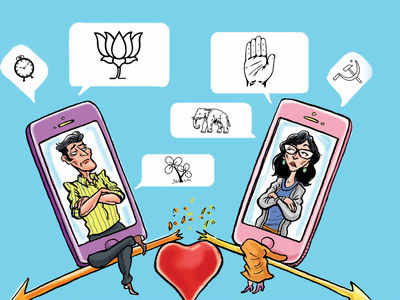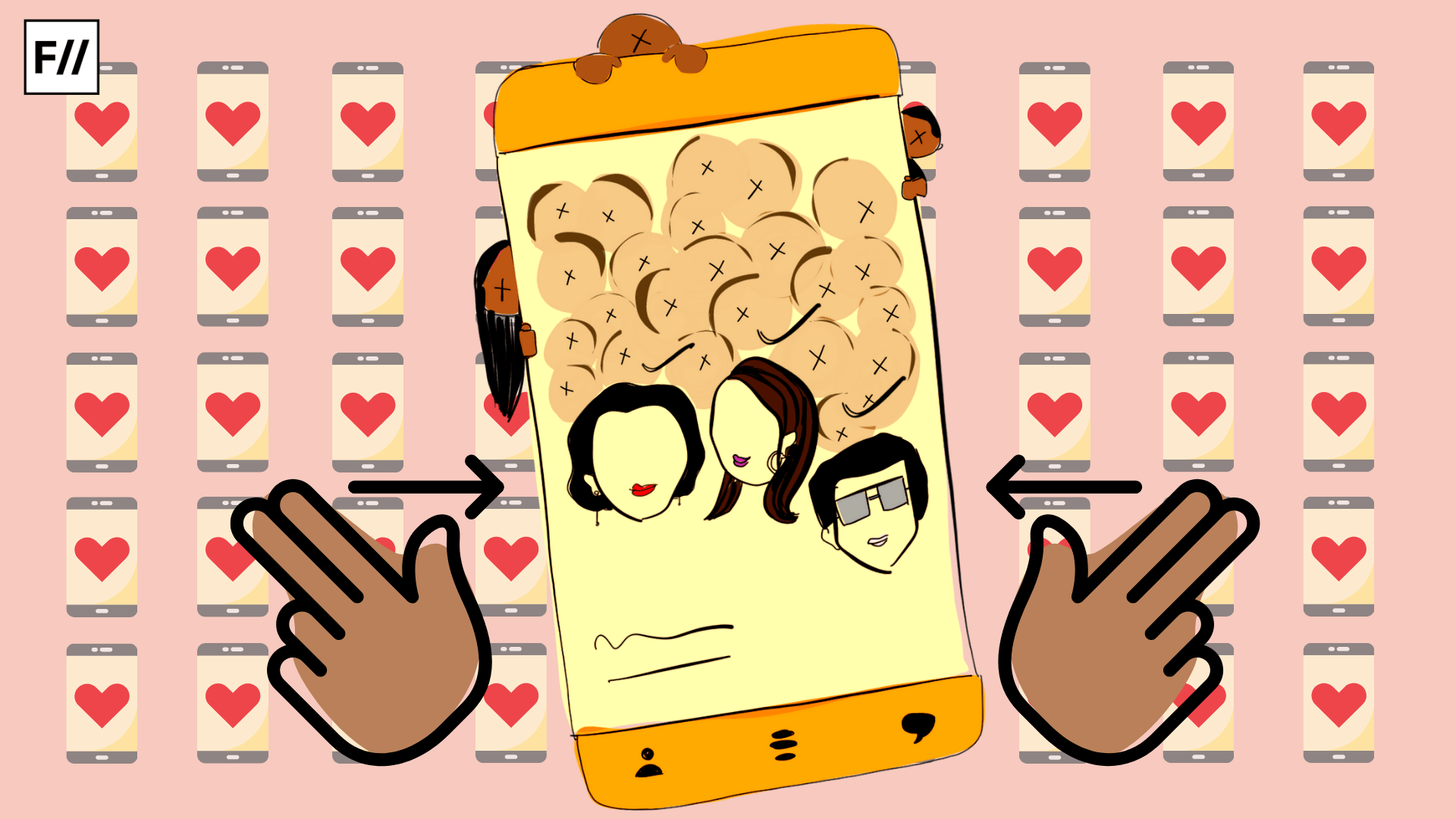On dating apps, everyone wants to smash patriarchy and end capitalism.
Tinder bios announce “swipe right only if left” cautioning possible right-wingers and Modi Bhakts. Cis-men write “die hard feminist” and wear a nose pin. Plans for a perfect date are “overthrowing the government”, and almost every progressive person’s Tinder pictures include one where they are at a protest – preferably holding a placard of a popular alliteration, “Fuck Fascism”.
There has been a perceptible shift in the visual metrics of the dating marketplace – everyone is “woke”, or appears to be. It is virtually impossible in this current cultural moment to go out with someone from a dating app and not know who they vote for. It seems that the platitude, “personal is political” has been injected with a new life – one where the desires of the bedroom are deeply invested in the performance of everyday politics.

At one end, such appearances point towards a politically aware generation which believes in revolutionary politics. While on the other end, most suspect that such a positioning is merely a performance or more precisely, as a friend from college puts it, “using activist language to get laid”.
While my friend does not seem hopeful of the disingenuous alignment between activism and hookup culture, curiously enough, people on dating apps feel compelled to announce their politics. This makes one wonder; are dating apps at the brink of mass political organising? Do people who want to “fuck fascism”, fuck each other in the hopes of building a cadre? Is this cadre building really happening in posh cafes and music festivals? And most importantly, can we dismantle capitalism and have good sex?
When my friend noted that people have started “using activist language to get laid”, we all laughed in our two bedroom flat, sipping cold rum from plastic cups. A moment later, it struck me that this is what flirting looks like today – if you write #DalitLivesMatter on your bio, then I’m hot for you. This performative politics and using serious issues as a token to get laid is highly repulsive and distasteful, and dating platforms, owned and run by corporate giants, are realistically the last place for a revolution
Speaking to users of dating apps like Tinder and Bumble, the majority of them announce their discomfort at coming across profiles which make use of current political fads. Soumya, 24, notes how people on dating apps use “politically correct language, mostly feminism, to gaslight women”, while Radif, 23, tiresomely observes the disturbing pretensions of people who romanticise protests as dating spots and render people’s lived trauma and experiences as aesthetics.
While there seems to be a consensus around the tastelessness of appearing “woke” on these apps, few have also noted how the language of political correctness becomes a refuge for appearing acceptable within a culture which prizes trending academic jargon like heteropatriarchy and hegemony. A, 24 (Anonymous) notes that there is a sizable section of people on dating apps, and society in general, who shame other people for not using the “correct” terminologies. They believe how this often acts as a deterrent, rather than a site of knowledge sharing, and cripples confidence.
Meetali, 23, feels that this shaming is unfortunate and more often than not she has found herself dating people who, despite appearing clueless about the “right” terms, seem genuine and kind in their conduct and actions.
Also read: Who Would You Swipe Right?: Dating Apps And The Basis Of Their Problematic Algorithms

Nevertheless, most agree that the so-called digital activism on dating apps is just virtue signaling, a plot to appear “superior” as observed by R (Anonymous), 25, and as one of the sources in a Cut article notes, to “mansplain Marx”.
When my friend noted that people have started “using activist language to get laid”, we all laughed in our two bedroom flat, sipping cold rum from plastic cups. A moment later, it struck me that this is what flirting looks like today – if you write #DalitLivesMatter on your bio, then I’m hot for you. This performative politics and using serious issues as a token to get laid is highly repulsive and distasteful, and dating platforms, owned and run by corporate giants, are realistically the last place for a revolution.
After recognising this, appearing “woke” leaves a bitter taste in our mouths. While we are all on dating apps, swiping left and right for hours at an end, it becomes almost an affront to use the platform and its drop down lists to choose “activism” as one’s passions right next to “house parties”
Apps like Tinder and Bumble operate within the neoliberal market. The commodification of love and desire is a symptom of unethical consumerism, where we treat humans as consumer goods and judge them by the value of the pleasure they offer. In fact, the swiping function on most dating apps was designed to mimic a deck of playing cards.
These dating apps are known as Uber for sex, or virtual marketplaces where we are almost shopping for sex. No matter how inclusive and progressive their promotional ads appear, by casting trans women or combating questions of consent – dating apps only formalise societal inequalities : of caste, class, gender and capital. It seems hopeless, vicious even, to be profiling people and choosing them according to their desirability, an algorithm which is seldom favorable to marginisalised identities like Dalit women in India and Black women across the world.

While dating apps and cybersex have made it easier for many queer identities to access desire and intimacy, however, as Michel Foucault’s History of Sexuality urges us to remember, the unfolding of a field of possible new terrains for the exploration of sexuality does not necessarily imply its liberation.
After recognising this, appearing “woke” leaves a bitter taste in our mouths. While we are all on dating apps, swiping left and right for hours at an end, it becomes almost an affront to use the platform and its drop down lists to choose “activism” as one’s passions right next to “house parties”.
Manche notes how “the sexuality enabled by Tinder…is constituted by the power of the financialised market…and sustains the current economic organisation of life by affections that might or might not be experienced as joyful, but are generally represented as such, if only to fool us”. Dating apps like Tinder and Bumble challenge nothing, dismantle nothing and offer nothing. What they do enable is an easy access (for some) to sex from a catalogue of matches, while the market economy prospers.
Whenever I have gone through a breakup, I have turned to dating apps. Whenever my friends have found a lull in their sexual lives, they have also turned to dating apps. Whenever any one of us have found ourselves bored, we have still turned to dating apps. The ubiquity of traffic on these apps is routine, and continues to be.
While we will all patter on about systemic collapse and neoliberalism, our helpless resignation to the larger structures of capital – I can only think of what Christina Dhananraj said – “apps don’t kill caste, we do”. And neither do they kill capitalism, fascism and all the other ‘isms’ which so smugly appear on Tinder’s 500-character limit.
Also read: NotOK, Cupid! Misogyny in Online Dating
Featured Image: Ritika Banerjee for Feminism In India




